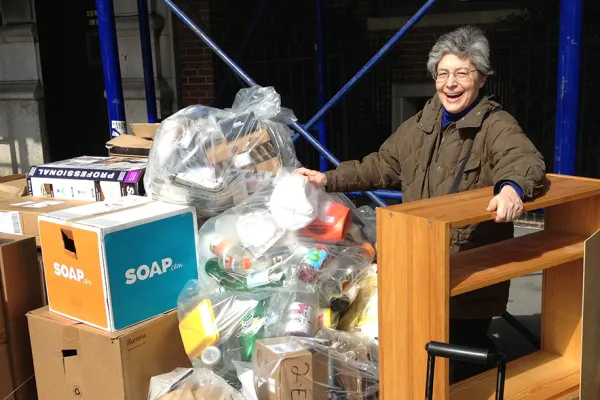Turning Trash to Treasure: Jacquelyn Ottman ’77 Shares Ideas for Reducing Waste
Alum News

Published March 27, 2015
Jacquelyn Ottman ’77 is on a mission to eliminate wasteful practices and overconsumption.
Her professional foray into environmentalism began in 1989 when she launched a consulting firm to help businesses become leaders in sustainable practices.
Ottman will participate in “Smith Women in the Environment,” an alumnae panel discussion to be held Monday, March 30, at 4 p.m. in Neilson Browsing Room. She will also give a free public workshop, “Get Rid of the Waste. Get On With a Better Life,” on Tuesday March 31, at 7 p.m. in McConnell Auditorium.
Here’s what Ottman had to say in a recent conversation about her ongoing work on the sustainability front:
How have companies changed their environmental awareness and socially responsible practices since you founded your consulting firm?
Ottman: “Definitely over the past 25 years consumer-facing businesses have realized this is something that is of extreme concern to consumers and employees. It affects their ability to recruit people, especially younger people, and it affects employee morale. Companies are taking steps to use different types of materials so their products can be recycled or composted. They are making their products more energy efficient, and there are more sustainable practices going on internally, such as the zero waste movement. This is now an intrinsic part of how people do business.”
What is the mission of WeHatetoWaste.com, which you launched in 2013?
Ottman: “We define WeHateToWaste.com as a global forum in which consumers can share stories, strategies and tips for creatively reducing waste in their lives, workplaces and on the go. We’re also using it as a platform for bringing training online and offline to communities for reducing waste.”
Your green marketing blog mentions different cultural approaches to waste reduction. What’s one idea that you find particularly inspiring?
Ottman: “In Japan, one principle people live by is mottainai—the idea that every product and material has a soul. For example, you consider the tree that gave its life so that you could have a chair and a table. The goal is to respect every material good that you own so that you get the most value out of it.”
You advocate moving away from a throwaway mentality. How can that happen?
Ottman: “In WeHatetoWaste, we put more emphasis on ‘reduce and reuse’ as opposed to just recycling. I’m concerned that recycling in the United States is becoming the new excuse to continue to consume. People have no idea what it took to create something in the first place, and they don’t know about all the environmental impacts associated with recycling. We have a 34 percent recycling rate in this country, and if you took away yard trimmings, the amount of what we’re recycling actually isn’t that much. Recycling and composting have also flattened out here over the last four or five years. That puts more emphasis on preventing waste.”
How did Smith influence your career path into sustainability?
Ottman: “During my senior year I was head of the Koffee Klatch, a coffee and donut center in the basement of Seelye Hall that earned money for the Service Organizations of Smith. I was able to expand sales and revenue, and I brought a lot of entrepreneurial skills into recruiting people—we had 150 people working. It was a socially responsible business with a cause marketing campaign, and it gave me my first experience into understanding how business can be harnessed for good.
What message do you hope to impart to Smith students in your workshop?
Ottman: “I want students to generate ideas and consider how we can we harness the creative skills that exist at Smith to reduce waste, like creating a mending circle at Friday teas, where students bring their sewing kits and let people know they can repair things. We can look at things like waste reduction projects in Smith houses and what Neilson Library could lend other than books. I want to catalyze more thinking and doing.”
What are five things we can do right now to reduce waste?
Ottman:
- “Use as many reusable items as possible vs. single-use disposables. For example, use a cloth bag, a reusable coffee cup or a French press, which doesn’t require a filter.
- Don’t buy more food than you need; use all your food and compost scraps. One percent of everything that ends up in landfills is food waste, which decomposes into methane, a more potent greenhouse gas than carbon dioxide.
- Slow down fast fashion. Buy classic-styled clothing. Buy from secondhand stores, and host clothing swaps.
- Upgrade to use an electronic device as long as possible, and instead of throwing electronics away, pass them along to others, such as schools.
- Reuse, reuse, reuse. Borrow, share, set up a free box. Keep stuff moving, not dead-ending in a landfill.”
Sustainable business consultant Jacquelyn Ottman ’77 sees opportunities for reuse everywhere, such as discovering a bookcase in the trash. Ottman will be part of a Smith Women in the Environment panel March 30 on campus.